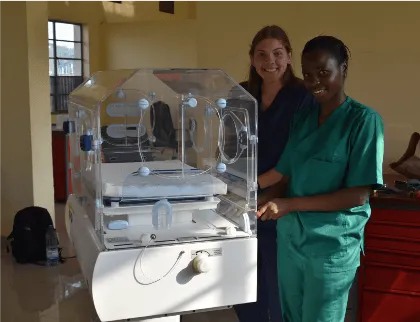More than ever before, individuals and institutions are empowered to improve healthcare around the world—but often face systematic logistical obstacles. Up to 70 percent of donated medical devices, for example, end up unused in Africa, according to the World Health Organization.
That’s how CEMS students Jonathan Ferri ‘20 and Madeleine McGill ’21, landed summer experiences in Tanzania and Rwanda, respectively. As they recently presented to the CEMS Board of Advisors, the Engineering World Health Institute has matched the need for repaired medical devices in resource-poor communities with learning opportunities for students—resulting in life-changing experiences for both sides.
A Transformative SEED Capstone
Ferri spent three months troubleshooting ultrasound machines, among other tasks, while learning Swahili and enjoying such Tanzanian customs as “taking chai,” a mid-morning break of mbege (banana and beef stew), which often inspired solutions. He returned with not only new skills but also a SEED capstone project of designing a prosthetic foot prototype. “This program allowed me to do everything I wanted,” he says, “and it all happened to be in Tanzania.”
Gratitude and Perspective
McGill, meanwhile, devoted her time to repairing infant incubators, oxygen concentrators and other medical equipment at two Rwandan hospitals, where she adjusted to what first appeared to be a slow pace but really represented the people’s appreciation for life and the work the team was doing. “I gained a real gratitude for taking a step back,” she says. “I always thought that biomedical engineering innovation is a really cool, important, and growing field, but I worry about our innovation increasing so much that it really only helps a small fraction of the world’s population.”
Now, thanks to these unique summer programs, CEMS students are learning how to overcome old obstacles and make a much broader impact worldwide.
